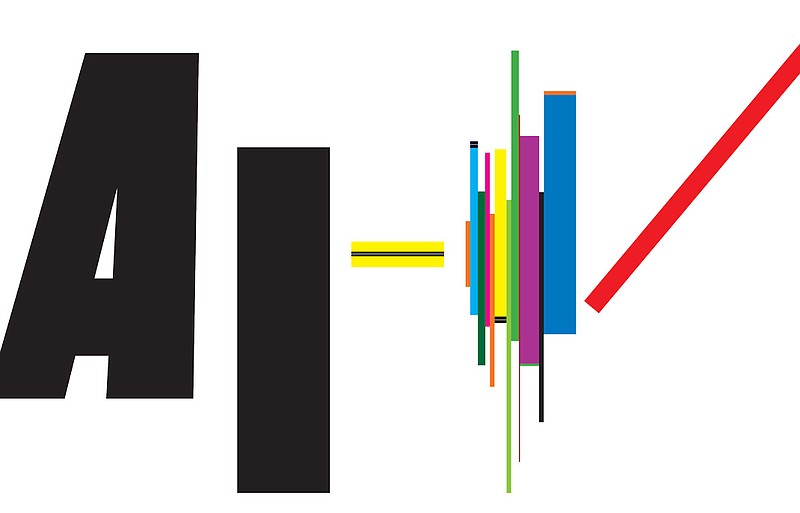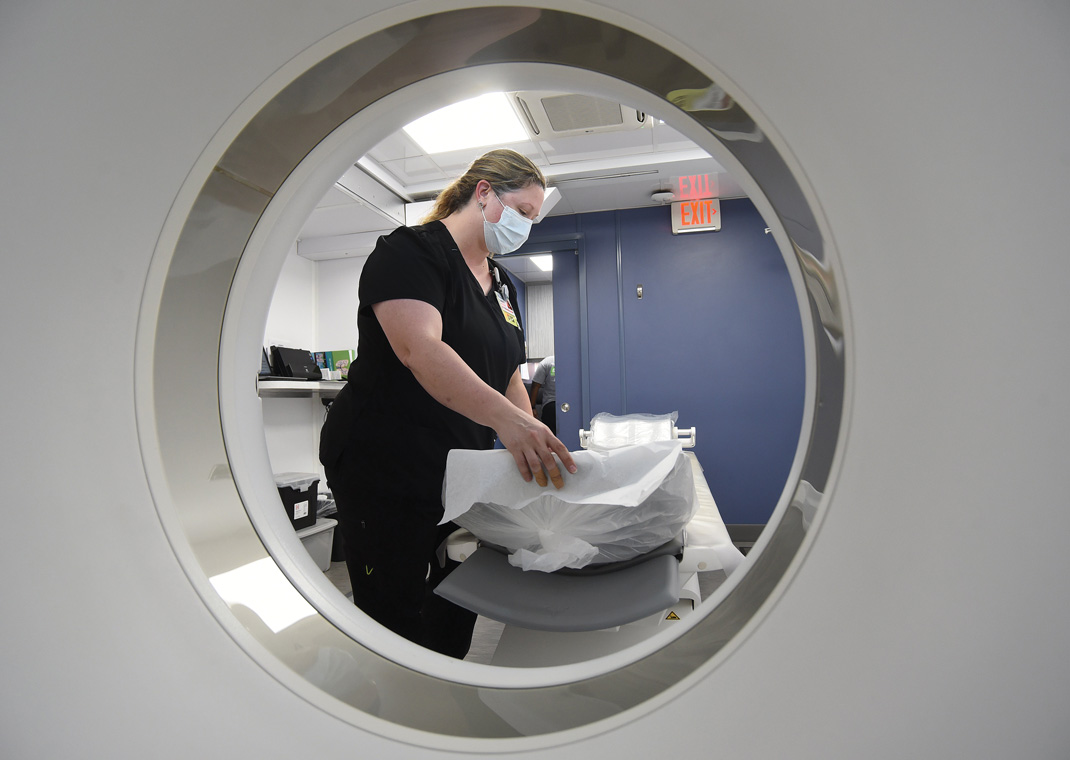Hmm. Machines that think like humans.
For some, the thought is apocalyptic. For others, revolutionary. But whether the idea of thinking machines sparks fear or awe, the fact is they're here and they've been changing the way the world works for years now.
In November 2022, "machine learning," a distinctive branch of artificial intelligence (AI), captivated the public's attention with the debut of ChatGPT (short for Chat Generative Pre-Trained Transformer), developed by OpenAI, a research and development company. Known as a "large language model," ChatGPT's capabilities have stirred considerable interest and discussion.
Since its arrival, ChatGPT has delighted the world with its ability to instantaneously complete complex tasks. In the mood for a Star Trek-inspired poem written in Bob Dylan's unique style? How about an outline for your new novel? Try asking it to generate computer code.
While often seemingly miraculous, it has vexed many users, as well. Try counting on it as a resource for factual information, and you're asking for trouble, experts agree.
Among the recent surge of AI language models, ChatGPT stands out as one of the most prominent examples, trained on hundreds of billions of words and phrases in natural language. But chatbots such as ChatGPT are just a small subset of the world of AI.
Training sessions
There are two overarching types of AI -- traditional and generative. In traditional, there is no "learning." Systems are designed to be task-oriented. Generative, on the other hand, is more versatile -- capable of creating new content that has never before existed based on patterns learned from the data it was trained on.
"How does a machine think?,"asks Beni Asllani, professor of AI and data science at the University of Tennessee at Chattanooga (UTC). "Like humans, they have to learn through training. And for computers, that training is done through algorithms and data."
A highly simplified explanation:
First, a computer is given massive amounts of data relevant to the task it needs to learn. If, for example, it's learning to recognize cats, it needs many pictures of cats.
The computer uses this data to look for patterns and features that distinguish cats from other things, adjusting its internal settings, known as parameters, to recognize these patterns.
After training, the model is tested with new data to see how well it can identify cats. If it makes mistakes, it learns from these errors and adjusts its settings to improve its accuracy.
Once trained, the model can then be used to make predictions or decisions on new, unseen data. For instance, it can identify whether a new image contains a cat based on what it learned during training.
In the business world, the implications of AI technology are far-reaching.
"As of now, we have only seen incremental changes," says Asllani. "But very soon, probably within three to five years, AI will be so ingrained in our professional lives, and how we predict and make decisions, it will change the way we do business."
New business models will be created, like with Amazon, he says. Right now, when customers make a purchase, we get prompts suggesting other products we may want to buy. He says AI is projected to boost predictive accuracy to around 98% -- close enough to prompt companies like Amazon to proactively send additional products. Essentially, AI will anticipate a customer's needs even before the customer is aware of them.
But while machine learning can be used as a powerful tool for enhancing efficiency and boosting profitability, it raises big questions about ethics, accountability and responsible use.
Trustworthy or trash
Ultimately, the value in how AI is used is directly related to how it is trained. That is to say, whether it was built with biases, intentional or unintentional.
"This is where we get into the disruptive aspects," says April Sawhill, director and attorney at Grant, Konvalinka & Harrison, PC, who, prior to moving to Chattanooga, was employed at William & Mary Law School as the Assistant Director of Research at the Center for Legal & Court Technology. "If an AI system is gathering data that's skewed, you will only get a version based on what the machine can find and collect. This is where the potential for bias and underrepresentation exists.
There are documented studies, related to Human Resources (HR)and hiring, where algorithms were designed to identify candidates with specific characteristics," she says. "You can imagine a situation where an employer finds, for example, that the AI algorithm was selecting resumes from predominantly white males -- because it was trained on data prevalent with those types of profiles."
"People fear that machines will replace humans in the workforce, but I don't think that is going to happen. We need humans to monitor what AI produces, ensuring it is vetted for unintended outcomes."
Ultimately, AI has no emotion and can't determine the "soft side" of humans. AI can only read a resume and choose the person that fits the parameters, as defined by the programmer who wrote the algorithm.
"What it is not able to detect, but what the human employer is looking for, are qualities like 'Is this person trustworthy? Do they make good eye contact? Would I be comfortable putting this person in front of a client?' -- the intangibles."
Future ready
"AI is here to stay," says Sawhill. "We're not turning the clock back. It's one of those things that you either get on board and buckle up and learn the systems, or you get left behind."
She predicts that industries, such as HR and law, will experience significant change in how work is done. For example, while legal research has historically been conducted in libraries, it is now done primarily through online databases, rendering physical libraries obsolete. In today's world, generative AI is quickly being introduced in legal databases to assist lawyers with research and creation of content, which will have disruptive impacts on the time and cost for legal services.
Chattanooga schools, community college and universities are all starting to take AI learning seriously, and have starting offering courses.
For the first time, UTC will offer AI in Business, which Asllani says is already full. In the course, students will learn about different types of AI, ethical issues, privacy concerns, government roles, about how to start a business with the technology.
Asllani says UTC is also adding an AI course to its general curriculum "which means the university feels that every student needs to know about AI, no matter what their major is -- art, math, everything."
The fear factor
"We should not be scared of computers becoming smarter than us," says UTC's Asllani. "They will just simply be helping us." He uses an example of high-level CEOs, who often claim their key to success is hiring people who are smarter than themselves.
"Computers don't have feelings. They don't have the need for power or to attain infinite wealth or the desire to spend the rest of their life by the beach," he says. "They perform based on what we need them to do. As professionals, we can give directions to these smarter entities."
Where there is legitimate cause for concern is with creating a legal framework for responsible AI systems that protecting user privacy, avoiding biases, and generate data that keeps people safe.
Up to us
AI is neutral, says Sawhill, hearkening back to some of the ethics issues. Whether it is seen as a positive or negative force for change, depends on human intentions.
"In terms of whether we trust it -- we don't know the coder, or where it's pulling data from, or the biases," she says. "One example would be that most coders are male. Would they approach a problem the same way as women? Then there are factors like class and race. Algorithms are determined by the human who is generating them to begin with."
But even with its pitfalls and shortcomings, AI has already proven itself as a useful tool in helping business become more efficient and boost productivity. She uses logistics as an example, the job of planning and moving goods, services and information around the world.
AI is able to analyze huge amounts of data on factors like traffic patterns, employee availability, gas prices, weather and more -- amounts that would be impossible for a human to process.
"These systems can find things in an instant that would take humans years," she says. "I think people are surprised at how far AI has come in such a short amount of time. ... It's impossible to predict how quickly systems can learn and move beyond us."
Here are some of the ways industries around Chattanooga are already putting AI to use:
Bea's Restaurant — Small Business
Dusty Bradshaw firmly believes AI is going to be revolutionary for small business owners.
Bradshaw is the owner of Bea's Restaurant, a Southern family-style restaurant that has been a fixture in Chattanooga since it opened in 1950. A lot has stayed the same since that time -- the restaurant is run by the same family, in the same location, with the same menu.
But with the power of AI, Bradshaw has been able to visualize what a modern version of his family's restaurant might look like.
In December, Bradshaw posted AI-generated images of the restaurant to social media. His customer base reacted -- some excited, some worried about changing the formula they've come to know and love.
Bradshaw says his family will never give up the original Bea's location on Dodds Avenue. And while he doesn't have immediate plans, he says the futuristic images are more than just playing around.
"It all starts with a dream, doesn't it?," he asks. "We've got a lot of years behind us with this restaurant, and hopefully in front of us."
Using AI, Bradshaw has also created a new logo, designed a label for their house-made Comeback Sauce (just hit the tables in December), and came up with a t-shirt design commemorating Bea's upcoming 75th anniversary.
Branding materials are something Bradshaw has wanted for a long time, but felt constrained by the expense of outsourcing the task.
A self-described "computer nerd," Bradshaw says he first became interested in programming with Linux back in the early 1990s. But the difference with AI, he says, is that it's much more enjoyable.
"I never in a million years would have thought we would be at this point," says Bradshaw, "where we can enter some text prompts, and be able to reimagine what another Bea's might look like."
FreightWaves — Logistics & Trucking
One of the biggest leaps in AI is expected to come from autonomous driving and delivery.
When vehicles become "smart enough," they could potentially replace the 3.5 million truck drivers currently operating millions of semi-trucks on America's highways. While new machines and computers are already being used to monitor and help drivers do their jobs, replacing drivers in the cab is probably decades away, according to experts. But in the meantime, AI is already making inroads in the industry.
Just like how electricity is available nearly everywhere, author and physicist Dr. Michio Kaku predicts that soon you will be able to ask for and get most any kind of information almost immediately.
"In the future, you will blink and be online," Kaku told the F-3 Future of Freight festival in Chattanooga last November. "The internet will be everywhere, including your contact lens. AI will allow you to talk to things and things will talk back to you. For companies like yours, that means if you simply ask for data about logistics, time frames and the progress of any shipment, it will come to you."
Kaku, a professor of theoretical physics in the City College of New York who has authored several books on the future of AI and quantum technologies, says AI represents the fourth wave of wealth creation, comparable to the sweeping changes ushered in from previous waves created by steam power, electricity and computers.
AI will help make supersonic jets more feasible for faster travel and enhance the amount and type of work done by robots to relieve repetitive, simple tasks.
FreightWaves CEO Craig Fuller, who has helped build his business on gathering and presenting logistics data, says AI allows information to be quickly gathered and interpreted for use in many ways.
"The more AI is used in supply chain, the more valuable data becomes, so we are very bullish on what AI will mean for our future growth," he says.
The emergence of AI also is changing the staffing needs of businesses.
To help build his logistics information platform, FreightWaves, to serve the trucking industry, Fuller says he hired actuaries and data scientists with far different backgrounds than the truckers, mechanics and freight sales people that his father and uncle hired at the trucking giants of U.S. Xpress Enterprises and Covenant Logistics.
"The person who led our data science unit came from Unum (a giant insurance company in Chattanooga)," Fuller recalls. "It used to be the actuaries was a boring, probably not that glamorous or high paying of a job, but now they are data scientists and they are getting $200,000 to $300,000 a year."
CHI Memorial — Health Care
Whether it's to speed up a diagnosis, assist with surgeries, communicate with patients or offload mundane tasks from staff, AI is playing an increasingly important role in Chattanooga's health care industry.
One example is CHI Memorial's "Breathe Easy" mobile lung CT coach, which is a bus that houses a CT scanner for the purpose of detecting lung cancer before it progresses to a late stage, which is much more difficult to treat.
From a 12-second chest scan, the machine produces a plethora of images that are electronically sent back to the hospital and analyzed by AI software in less than 10 minutes, compared to the hours it would take a human. Providers are then alerted to areas of concern and able to relay that information back to patients on the same day.
While the machine and software's primary purpose is to detect lung cancer, Dr. Rob Headrick, chief of thoracic surgery at CHI Memorial, says that it can also help diagnose an array of other ailments and conditions, including blocked coronary arteries, emphysema and aneurysms.
"It's using computers to not only read the study but be able to do things I can't do, and do it (faster)," Headrick says.
Volkswagen — Automotive
Volkswagen's hub for AI in North America is in Detroit, as the car company uses the technology to find patterns across huge data sets that make everyday business smarter and more efficient, according to the automaker.
AI is an extension of high-power data crunching that businesses have used for years, the company says. The data and the specialized hardware needed to analyze it powers algorithms that can help improve results and get to the right answers faster.
One example is a scheduling tool for workers at the German company's assembly plant in Chattanooga, where the automaker builds the Atlas and Atlas Cross Sport SUVs and the ID.4 electric SUV. With several thousand employees and multiple shifts, internal rules and individual skill sets, the possible permutations of setting a schedule quickly become immense.
As vehicles grow more digitally connected and demand more data for future technologies like automated driving, the need for AI solutions will increase, according to VW.
By locating its AI hub in Detroit, Volkswagen says it wants to attract researchers and developers who can shape the future of automotive industry and transportation.
But, all of the data does not mean using AI to replace employees with software, the company says.
UNUM — Insurance
At Unum, the company's digital team is studying ways to automate and use AI to improve company operations.
"Like most companies and organizations, we're definitely trying to figure out how we can lean into AI," says Kimberly Bowen, senior vice president of global talent at Unum "AI has been a part of our workflow in some areas for many years. We're not new to the AI space, but I think with the advances that have been made over the last year, we are looking at ways we can leverage those to help augment the work that our employees are already doing.
"Our philosophy is not that AI is going to replace our employees," Bowen says. "It is not a substitute for the human touch, but it absolutely can create efficiencies and take on those to tasks that are repeatable or mundane and free up the capacity of our employees to focus on more value-added tasks."
Bowen says Unum is focusing on "the marriage of human potential and technological support."
One prime way AI is already used by Unum is in talent acquisition by helping to screen through resumes and identify those who best match the needs of the company and those that best align with the job descriptions.
"Rather than having a recruiter scan thousands of resumes of those people on the market for a job, why not allow AI to do that and allow recruiters to focus on contact and followup to begin to build the relationships with prospective employees to help them understand the great culture we have worked to create at Unum," Bowen says. "That can save a lot of time -- perhaps shave as much as three days from the process of funneling talent through the process."
But Bowen says Unum is not rushing to automate telephone or customer response programs.
"Allowing for automated responses is not always the best solution," Bowen says. "Even though it might save time, it isn't necessarily going to create the experience that we want."
Unum has a digital transformation team working with others in communications and other areas to figure ways to best use AI without jeopardizing customer service.
University of Tennessee at Chattanooga — Education
Starting this year, UTC is introducing AI in Business, as well as a general curriculum course designed to give students a basic understanding of the technology as they move into the working world.
"Not all students will use AI, but being able to have an understanding of it will help with things as simple as a performance review, or how you may respond to an unhappy customer over email," says Vickie Farnsworth, UTC's Vice Chancellor of Information Technology and CIO.
As AI technology continues to gain popularity in the professional world, the university is working to educate students on how to use it effectively and responsibly.
"You can easily ask ChatGPT to solve a math problem, but then you're not learning," says Farnsworth. "However, it can be good for constructing sentences, or in how you may say something in a different way."
In addition to educating students, UTC itself has been putting AI to work through the use of chat bots designed to respond to frequently asked questions (FAQs). Before AI, the school's website would direct visitors to a static FAQ page.
"Behind the scenes, the bot is learning their questions," says Farnsworth. "There are times that a human may have to step in and help. But through the process, the bot learns, and so the next time they are able to answer that question."
During the 2023 fall semester, she says, the AI system was sufficient in answering more than 80% of questions presented.
READ MORE
* Will artificial intelligence replace Human Resources?
* EPB and Qubitekk’s Quantum Network embarking on technology’s next frontier




